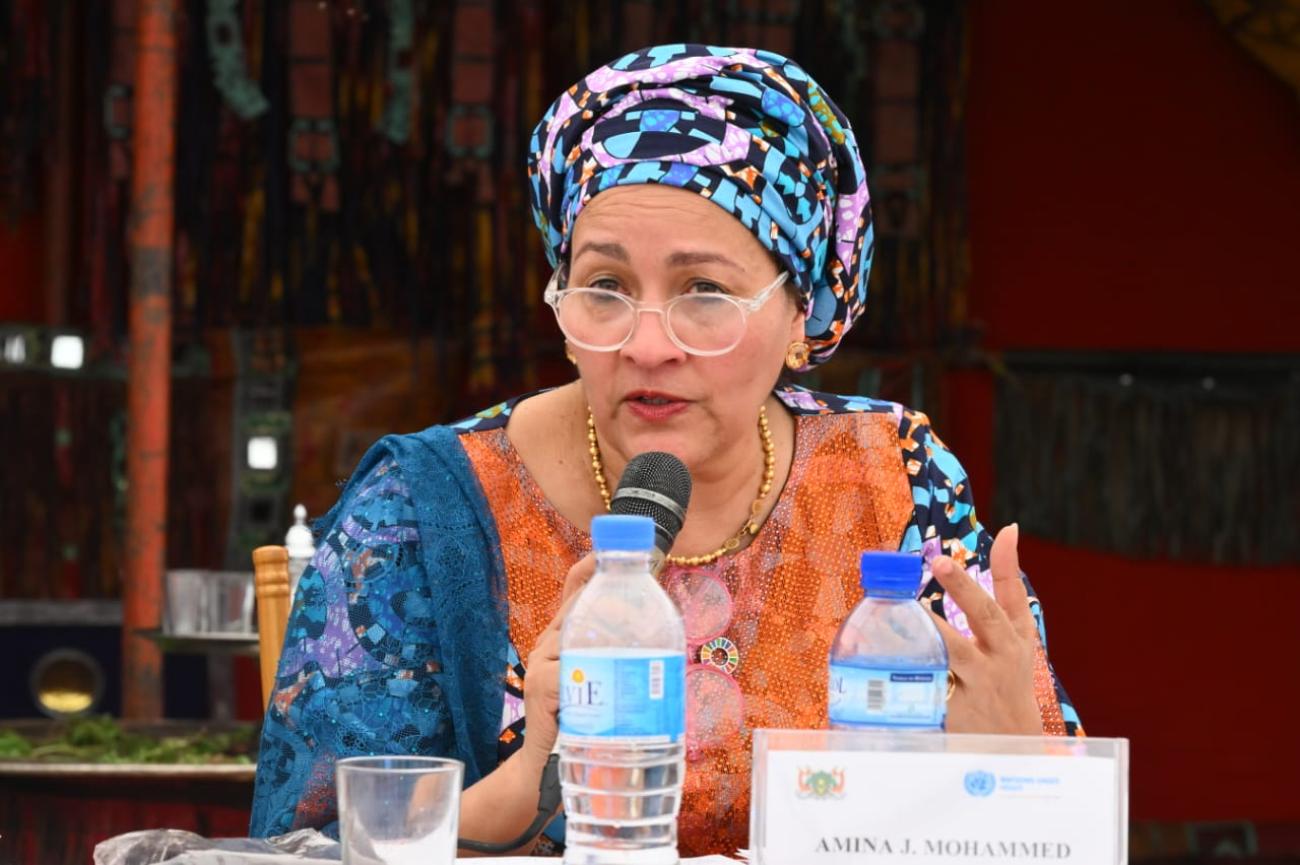UN deputy chief urges Resident Coordinators across Africa to maximize their convening power to tackle the unprecedented polycrisis

During her annual dialogue with Resident Coordinators from all over Africa, UN Deputy Secretary-General Amina J. Mohammed stressed that their convening power is more crucial than ever to mobilize political, financial, and public support for social and economic issues that have fallen out of the list of priorities in recent years and put them back again high on the political agenda of the countries they serve.
This year, Ms. Mohammed and the contingent of Resident Coordinators, who are the designated representatives of the Secretary-General in most countries, held their deep-dive discussion at a primary school, called “Ecole Pays-Bas,” in Niger’s capital Niamey. This was the first time their dialogue took place in a field setting.
“We always believe that the solutions to supporting a country will come from our discussion, and an exchange of experiences, so that we can scale them up across the continent with a sense of urgency,” she said.
Under the makeshift tent set up at the school playground, Ms. Mohammed laid out a series of observations on current trends, opportunities and challenges, particularly raising the alarm that halfway toward 2030, the majority of African countries are struggling to meet most of the targets for the Sustainable Development Goals.
She pointed out that the world is facing multiple, interlinked crises with cascading effects. The climate crisis is having increasingly dramatic impacts on lives and livelihoods, placing great pressure on governance institutions.
Additionally, the war in Ukraine has disrupted wheat and grain imports and contributed to inflation. Too many people can no longer afford basic staples. As inflation increases, supply chains falter as well.
She also raised the issue of shrinking fiscal space across the continent, while governments are being denied access to urgently needed funds. Of the 54 lower-income countries worldwide facing a high risk of debt distress, 24 are in Africa, including the two biggest economies on the continent, Egypt and Nigeria.
Against this backdrop, Ms. Mohammed emphasized that “the solutions to these challenges lie in Africa, and must be African-born and African-led.”
“The African Continental Free Trade Area has the potential to lift 30 million people out of extreme poverty. And the Great Green Wall and the Great Blue Wall both contain the seeds of deep transformational change towards a harmonious relationship with our environment,” she said.
And she underscored the need for the global community to get behind these initiatives and support government partners.
“Now it’s for the international community to prove that they are not alone,” she said, calling on Resident Coordinators to strategically engage with their government partners and support their ambitions to scale up efforts to tackle poverty and exclusion, embark on just transitions, and advance gender equality and human rights with a sense of urgency. She also added the importance of focusing on youth, amplifying on the development agenda as an emergency and scaling partnerships for resilience and recovery.
The Deputy Secretary-General called 2023 a defining year to rescue the SDGs, with several critical milestones coming up.
For example, the SDG Summit in September will be the centerpiece moment of 2023 to take stock of the state of the SDGs, and Ms. Mohammed urged Resident Coordinators to support and accompany the national authorities, as they will be asked to attend the summit with a clear vision and strong benchmarks to get the SDGs back on track in the coming years.
Resident Coordinators were also asked to continue their engagements at the highest level to ensure follow-up actions on the outcomes of global initiatives, including last September’s Transforming Education Summit. RCs can support and accompany governments to translate and accelerate national commitments into concrete action.
Participating in this meeting physically from the UN Headquarters in New York, Assistant Secretary-General Oscar Fernandez-Taranco for Development Coordination told Resident Coordinators that the next level of leadership is required to pull the UN together with strong results, innovation and transformation that they are leading in their countries.
Yacoub El-Hillo, Regional Director for Africa of the UN Development Coordination Office, mentioned that out of the UN Country Teams in 54 African countries, 52 of them will have developed their new UN Sustainable Development Cooperation Frameworks - the most important instrument to jointly plan and implement the UN’s development activities at the country level – by the end of 2023.
This year, Resident Coordinators and UN Country Teams in 15 countries across the continent are designing their Cooperation Frameworks. Mr. El-Hillo urged them to ensure the integration of the UN’s sub-regional strategies, African Union’s Agenda 2063, the African Continental Free Trade Area, the Secretary-General’s “Common Agenda” and other crucial regional and global strategies into their Cooperation Frameworks.
Among dozens of Resident Coordinators who spoke to the participants, Elena Panova, Resident Coordinator for Egypt, explained the interlocking challenges, ranging from alleviating both poverty and near-poverty to keeping climate action on the national agenda, while they can deliver on some of the key pathways, including food security, transforming education, and digitalization.
Faced with the triple nexus challenge of energy, water and food, Resident Coordinator for South Africa, Nelson Muffuh, stressed that national plans on just energy transition provide an opportunity, and the UN is placing its focus on the “just” part of transitions, which means “leaving no one behind,” supporting workers, women and girls in the areas that are impacted.
In closing the discussion, Ms. Mohammed reiterated the need to scale and accelerate efforts to keep the promise of the SDGs and appreciated the brain trust of experiences gained by Resident Coordinators, which will help the UN to try to right the wrongs in the world.
This news story was prepared by DCO Africa.













